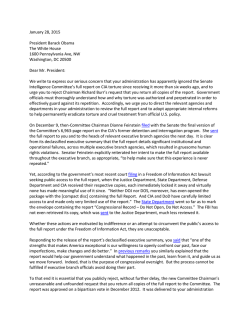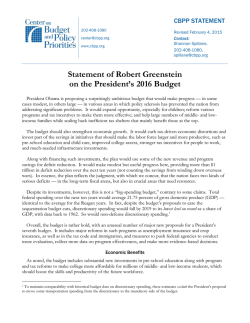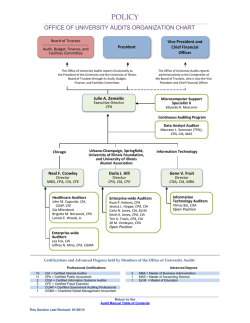
USA LEGACY CLOCK TICKING
USA: LEGACY CLOCK TICKING. IMPUNITY, GUANTÁNAMO AND DOUBLE STANDARDS 8 January 2016 AI Index: AMR 51/XXXX/2016 USA LEGACY CLOCK TICKING IMPUNITY, GUANTÁNAMO AND DOUBLE STANDARDS SOME DATES FOR THE LEGACY DIARY On 30 January 2016, the Guantánamo detentions will have been running for longer on President Barack Obama’s watch than that of his predecessor. Here is a date that should be of interest to President Barack Obama – 30 January 2016. That is the first day on which the detentions at Guantánamo Bay will have been running for longer on his watch than that of his predecessor. The Guantánamo detention facility may have been George W. Bush’s baby, but it is well and truly President Obama’s teenager – 14 years old on 11 January 2016. We have already entered a period in which impunity for crimes under international law committed in the CIA’s secret detention programme has persisted longer under President Obama than under President Bush. Now, more than two and a half thousand days after President Obama ordered closure of the Guantánamo detention facility by 22 January 2010 at the latest, his administration seems to have shelved its latest plan for closing it. Perhaps that is no great loss given the likelihood that the proposed plan would not have been grounded in human rights principles but in the USA’s flawed global “war” theory. Even if the administration’s proposals were to emerge and were to make it past congressional opposition, this plan was apparently never about ending indefinite detentions once and for all, but relocating at least some of them from the naval base in Cuba to the US mainland and keeping military commissions as a forum for a handful of prosecutions, with pursuit of the death penalty after trials falling short of international fair trial standards still on the table. Less than a year from now, 10 December 2016, we will see the eighth and final international Human Rights Day of the Obama presidency. Each of the previous seven have come and gone with impunity and an unlawful detention regime left intact and the USA on the wrong side of international human rights law even as it trumpets its commitment to such principles. Plan or no plan, as the 44th President of the United States of America begins his final year in the White House, he remains on course to go down in history as a head of state who failed – over two terms, year after year – to end the festering injustices associated with a prison camp he described in his fifth month in office as a “misguided experiment”. This is not to deny that it was the Bush administration that set this in train (with senior representatives of that administration still unapologetic for so doing), and that Congress has utterly failed to do its part to ensure that the USA meets its international human rights obligations on this issue. But for all the Time is running out fast for President Obama and his administration, not to mention Congress, to meet their human rights obligations on these issues while in office; or after they leave they will be known for their failure to do so. The legacy clock is ticking. 1 Amnesty International 8 January 2016 USA: LEGACY CLOCK TICKING. IMPUNITY, GUANTÁNAMO AND DOUBLE STANDARDS excuses for this failure that will be laid before the world, for all the blame that will be levelled at Congress, international law requires solutions, not political finger-pointing. And the administration has played an active part in keeping dozens of detainees where they are. The Department of Justice, for one, has devoted substantial resources to keeping individuals in indefinite detention or blocking their access to truth and remedy when such individuals have sought release or redress in the courts. transferred to military custody at the base in early September 2006. Six years after President Obama’s task force on closing Guantánamo stamped Abu Zubaydah’s “final disposition” as “referred for prosecution”, he remains uncharged. Meanwhile, those responsible for his torture and enforced disappearance, and of the torture and enforced disappearance of those detainees who followed him into the secret detention programme, remain at large courtesy of the Bush and the Obama administrations. Those who have a case to answer include the former President himself. President Obama’s legacy is also set to be one of overseeing an administration that has allowed systematic crimes under international law to go unpunished. Here, then, is another date for his consideration: 15 November 2015. That was his 2,490th day in the White House – one more than ran in President Bush’s time in office after he personally authorized the Central Intelligence Agency (CIA) to spirit away to secret detention in Thailand the first post-9/11 detainee the CIA deemed to have “high value”. That presidentially-approved transfer set in motion four and half years of enforced disappearance for the detainee in question, a period during which he was subjected to further torture and other ill-treatment authorized at high levels of government. Enforced disappearance, like torture, is a crime under international law. Ensuring accountability for these crimes is a legal obligation, an obligation that apparently features nowhere in the administration’s thinking on Guantánamo and beyond. Five days after Abu Zubaydah reached this shocking landmark, the world celebrated international Human Rights Day and marked the 67th anniversary of the adoption of the Universal Declaration of Human Rights. This date, 10 December, was one already in the White House diary, and President Obama issued a proclamation recalling how in 1948, “the leaders of 48 countries from around the world declared with one voice that progress depends on defending human rights”, and that the UDHR was “a milestone in our ongoing global march to uphold the inherent dignity and worth of every person.” He had issued a similar proclamation a year earlier to celebrate “[…] this extraordinary document [which] affirmed that every individual is born equal with inalienable rights, and it is the responsibility of governments to uphold these rights. … The United States will continue to support all those who champion these fundamental principles, and we will never stop speaking out for the human rights of all individuals at home and abroad. It is part of who we are as a people and what we stand for as a Nation.” As Guantánamo begins its 15th year of detentions, we have thus already entered a period in which impunity for crimes under international law committed in the CIA’s secret detention programme has persisted longer under President Obama than under President Bush. The Obama administration had the opportunity to break the impunity for the human rights violations of its predecessor’s and has failed to seize it. If this impunity remains intact into the future, it will have been the Obama administration that laid the cement around its foundations. Not when it comes to detentions at Guantánamo, or accountability for torture and enforced disappearance, however. Speaking out for human rights is not what the Obama administration has engaged in when promising to close Guantánamo. Instead it has proved stone deaf to those who have called for the detentions to be addressed as a human rights issue or for an end to impunity as human rights law binding on the USA requires. These calls have come from the UN, among others. Here is another date: 5 December 2015. On that day Zayn al Abidin Muhammad Husayn, known as Abu Zubaydah, began his 5,000th day in US custody without charge or trial. It was he whose transfer to enforced disappearance President Bush personally authorized on 29 March 2002. It was after taking Abu Zubaydah into custody, to quote the memoirs of the CIA Director at the time, George Tenet, that the CIA “got into holding and interrogating high-value detainees – ‘HVDs’, as we called them – in a serious way”. Many of the detention conditions and interrogation techniques that were then applied to others were first tested on Abu Zubaydah. In 2014, the USA appeared before the UN Human Rights Committee, the expert body established under the International Covenant on Civil and Political Rights (ICCPR) to monitor compliance with that treaty of states that have ratified it (the USA did so in 1992). Among its many concerns, the Committee addressed the ongoing detentions at Guantánamo. It called for the detainees there to be brought to trial – not in military commissions but the ordinary courts – or immediately released. This “system of administrative detention without charge or trial” must be ended, the Committee said. For Abu Zubaydah, justice is as elusive today as it was 13 and a half years ago. He remains at Guantánamo, the location of one of the numerous “black sites” in which he was held in CIA custody during his more than 1,600 days of enforced disappearance in various such sites before he was The Committee’s observations on Guantánamo were among those to which it said it expected a one-year prioritized follow-up response from the USA. That 2 Amnesty International 8 January 2016 USA: LEGACY CLOCK TICKING. IMPUNITY, GUANTÁNAMO AND DOUBLE STANDARDS response came on 31 March 2015 from the Obama administration, which essentially told the Committee to back off – that the ICCPR does not apply: individuals no longer than necessary to mitigate the threat they pose.” It is over a year since the UN Committee Against Torture, while welcoming the administration’s shift in position to accept the application of the UN Convention against Torture and Other Cruel, Inhuman or Degrading Treatment or Punishment to Guantánamo, expressed its dismay at the USA’s failure to withdraw the reservation to article 16 (prohibiting cruel, inhuman or degrading treatment) as well as deep concern about the continuing indefinite detentions without charge, which the Committee reiterated are a violation of the treaty. “We preface this response by recalling the longstanding position of the United States that obligations under the Covenant apply only with respect to individuals who are both within the territory of a State Party and within its jurisdiction. The United States continues to have legal authority under the law of war to detain Guantánamo detainees until the end of hostilities, consistent with US law and applicable international law, but it has elected, as a policy matter, to ensure that it holds them no longer than necessary to mitigate the threat they pose.” The eve of Human Rights Day in 2015, 9 December, coincided with the first anniversary of the publication of the summary report into the CIA programme produced by the Senate Select Committee on Intelligence. Among the cases referenced was that of Mustafa Ahmad al-Hawsawi, now facing the possibility of the death penalty after an unfair trial by military commission at Guantánamo. Prior to being brought to the naval base on 4 September 2006, he had been held in secret CIA custody for nearly 1,300 days. During the final months of his enforced disappearance, he had developed serious medical problems. His lawyers report that he continues to have severe medical issues today, including as a result of his torture and other ill-treatment in secret CIA custody, for which he is not receiving adequate treatment. The Committee was unimpressed. In a response sent to the US authorities in October 2015, it reiterated its recommendations on Guantánamo, noting the continuing administrative detention without charge or trial of individuals there and regretting the administration’s continuing pursuit of trials by military commission. The USA also appeared before the UN Committee for the Elimination of Racial Discrimination in 2014. This Committee similarly took issue with the Guantánamo detention regime – which at its core is discriminatory (on the basis of nationality): “The Committee urges the State party to end the system of administrative detention without charge or trial and ensure the closure of the Guantánamo Bay facility without further delay. …[I]t also calls upon the State party to guarantee the right of detainees to a fair trial, in compliance with international human rights standards, and to ensure that any detainee who is not charged and tried is released immediately.” The Senate Committee revealed that Mustafa alHawsawi had been subjected to “excessive force” during “rectal exams” conducted in secret CIA custody in Afghanistan, and that during interrogation sessions on 5 and 6 April 2003, two CIA interrogators had subjected him to “water dousing”. Another interrogator reported that Mustafa alHawsawi might have been waterboarded or subjected to treatment that “could be indistinguishable from the waterboard” (a form of torture in which the detainee is subjected to interrupted drowning). The Obama administration provided its one-year answer to this in September 2015. Again, the subtext of its diplomatic retort to this treaty body amounted to “back off”, that this was an issue falling outside the Committee’s mandate and the detentions would continue for as long as the USA wants: More detail of Mustafa al-Hawsawi’s enforced disappearance, torture and other ill-treatment in CIA custody presumably appears in the Committee’s full 6,700-page report which, over a year after publication of the summary, remains classified at the highest levels of secrecy, gathering dust away from any public scrutiny, helping to block truth, remedy and accountability. Volume III of this report details the interrogation techniques and detention conditions to which each detainee held in the programme was subjected. On 21 January 2016, it will be seven years since President Obama signed a memorandum that his was to be an administration “committed to creating an unprecedented level of openness in Government… Transparency promotes accountability”. The light of day must be poured onto the Senate Committee’s report. “We preface this response by noting that the United States is committed, in the interest of promoting dialogue and cooperation, to providing information in response to the Committee’s requests to the degree practicable, even where we may not agree that a given request bears directly on obligations under the Convention. The United States continues to have legal authority to detain Guantanamo detainees until the end of hostilities, consistent with US law and applicable international law, but it has elected, as a policy matter, to ensure that it holds In its October 2015 response to the Obama administration’s one-year reply to it, the UN Human 3 Amnesty International 8 January 2016 USA: LEGACY CLOCK TICKING. IMPUNITY, GUANTÁNAMO AND DOUBLE STANDARDS Rights Committee expressed concern at the continuing classification of the full SSCI report and also at indications that the Department of Justice had no intention of reopening investigations into the CIA programme, “despite having access to the full report”. The Committee reiterated its recommendations regarding the failure of the USA to end impunity, and expressed concern that current and former Guantánamo detainees were being deprived of their ability to “seek judicial remedy for torture and other human rights violations incurred while in US custody”. with the threat from terrorism we still face today. One of the great aspects of our democracy is that we are willing to look at our past, identify where we could and should do better, and make important improvements, which we continue to do”. Accountability and remedy for undoubted crimes under international law have fallen by the wayside in this self-congratulatory analysis. “I believe in American exceptionalism with every fibre of my being”, President Obama told an audience at the US Military Academy at West Point, New York on 28 May 2014, continuing: Not all those still in Guantánamo were subjected to the CIA detention program prior to being brought to the base (although more than two dozen were). One such individual is Obaidullah for whom 29 March 2016 will be his 5,000th day in US military custody without charge or trial. Another year and this Afghan national will have spent three quarters of his life in detention, having been arrested in 2002 when he was 19 years old and interrogated under alleged torture and other ill-treatment by US military forces. His daughter is near her 14th birthday. He has never met her in person. “But what makes us exceptional is not our ability to flout international norms and the rule of law; it is our willingness to affirm them through our actions. And that’s why I will continue to push to close Gitmo – because American values and legal traditions do not permit the indefinite detention of people beyond our borders.” Nevertheless, his administration’s absolute failure to see and address the detentions as a human rights issue means that these indefinite detentions could be said to have become a 14-year-old tradition. Perhaps the White House should make note of another date, 25 March 2016. That will be the sixth anniversary of a speech by the then legal advisor to the Department of State in which he emphasised that “the most important difference” between the Bush and Obama administrations would be the latter’s “approach and attitude toward international law.” This, we were assured, included respect for international law and an approach of “following universal standards, not double standards.” The establishment of the Guantánamo prison camp was grounded in US exceptionalism – the USA made up the rules of what it dubbed the “global war on terror” without reference to international human rights law and standards. The failure to close the detention facility is the result of more of the same exceptionalism. In May 2009, elaborating on his closure order, President Obama said that the detention facility had been set up under “the misplaced notion that a prison there would be beyond the law”. Yet for the six and a half years since then his administration has continued to apply this “misplaced notion” by keeping the detainees beyond the reach of international human rights law. In each of the six years since that speech, the Department of State has continued to publish its annual assessment of the human rights records of other countries. Failure to adhere to obligations under the UDHR, the ICCPR and other international human rights law and standards, including bringing to justice those officials or former officials responsible for human rights violations, draws the USA’s frequent condemnation. So the story on these issues is one of double standards, impunity for crimes under international law, indefinite detentions, unfair trials by military commission, secrecy serving to block truth, remedy and accountability, and rejection after rejection of the recommendations of UN treaty bodies and other human rights experts. In late November 2015, the Obama administration filed its one-year response to the UN Committee Against Torture’s review of 2014. The Committee had requested as a matter of priority follow-up information to its recommendations relating to investigations, prosecutions and “sanctioning perpetrators of torture or ill-treatment”, including in the CIA programme. In response, the USA merely reiterated what the Committee found inadequate during the review, namely that an investigation into CIA interrogations had been conducted and closed, with no charges referred. It also repeated its focus on the future by seeking to consign to history and impunity what had happened in the program: 10 December 2016 will be the eighth and final international Human Rights Day of the Obama presidency. Each of the previous seven has come and gone with impunity and an unlawful detention regime left intact and the USA on the wrong side of international human rights law even as it trumpets its commitment to such standards. Time is fast running out for President Obama and his administration, not to mention Congress, to meet their human rights obligations on these issues while in office; or after they leave they will be known for their failure to do so. “the decisions following the attacks of September 11, 2001, relating to this former program are part of our history and are not representative of the way we deal The legacy clock is ticking. 4 Amnesty International 8 January 2016
© Copyright 2026







